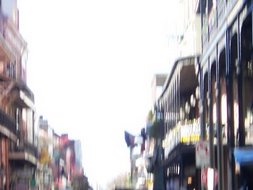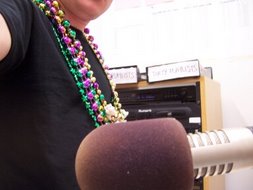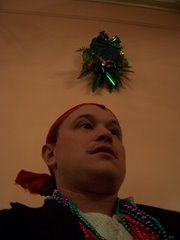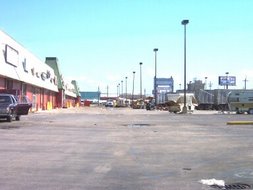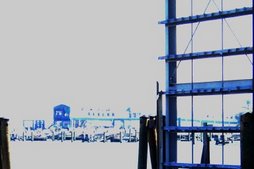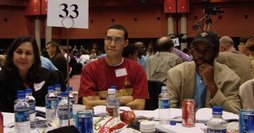Briefly: To do Waiting for Godot is not to do uplift, romance, history, tangential, local, or chance. Waiting for Godot involves lack of control, the indistinguishable character of life’s moments, enslavement, pointlessness, the better option of bullshitting with your friend and waiting. Not doing, but waiting. Not to be saved, for there is nothing to be saved from. Not by another, either, since his only promise is to show up, not to deliver the message or a solution. This play offers no prescription, and that is fine. It offers damnation. It offers futility. It offers yet another night. On the way to the bleachers at the tail end of the second line, I think, “Well, get ready, y’all, ‘cause now here comes Beckett and Beckett is a real punch in the face.”
The second layer of difficulty: The very specificity of the site seems to work against the text. We do not ask, “Where are we?” because we know. We know now that we’ve come here to the Lower 9th Ward, know that we’ve shown our intent. We know it as a place of history, where consequences have laid flat all of previous life. Over there is the canal; there, the silhouette of a bridge, the pink sky familiar and ever-vanishing. At no time would we ask, “Is this the place?”
But do we recognize it? Oh, yes - the name The Lower 9th Ward is large print and world famous at this point. Doomed to haunt history books in the chapter, “Late Evening of the American Experiment,” this neighborhood could not be more specific. Against the play’s spatial waiting—a limbo in which the characters don’t know their way and grasp for the distinguishing features—the weight of this site’s unique condition is unyielding.
One slice of ingenuity of this Godot was the decision to hold the first weekend in the Lower 9th Ward, and the second in Gentilly, the slightly suburban, more recently constructed neighborhood that suffered just as terribly, if not as visibly in the national/historical/cause célèbre eye. The two sites cover both the desolation at the play’s center and the half-forms of its speech and events. Where are we? We know…no we don’t know…no, well, we KNEW…who knows?
In the Lower 9th Ward, the sky feels larger, like we’re out in the plains. Where homes once stood, foundation slabs lie half-hidden in the tall weeds. The wind picks up and the night is hard on the underdressed. At some points during the play, the long grass waves gently, and in others you hear a train whistle. The mosquitoes are massive.
“Upstage” means down the street, and the actors appear out of the darkness from a distance of perhaps thirty yards. The overgrowth is up to the men’s waists, and in spots, they almost disappear into it. (I keep thinking of the scale of this set, of how nuts it must’ve been for the director to have this much space to work with. For some reason, Godot is always on the most compact of stages in my mind.) The remains of what looks to be a roof sit back on the former city block to the right, nearly obscured by the high grass. At one point, Didi stands on that roof and breaks down, and the actor Wendell Pierce wrestles free from theater’s imagination and into history’s curse. His voice breaks and for a few breaths, we shudder in the void with him.
In Gentilly, the set is a two-story house in the midst of renovation, its exterior battered, the interior partially visible. Set on a neighborhood side street, in a row of similar houses in different states of repair and neglect and habitation, the house is stripped bare inside, worse off than some, in better shape than others. The actors go in, ascend an unfinished staircase and emerge from the windows, and are nearly in the audience’s lap. They seem trapped, pinned down. The light is quite harsh against the building’s white siding, and a fever of claustrophobia seeps in. The characters might be inmates or the left-behinds of a family, but they are certainly under our microscope. They move among us, vertically as well as horizontally. Instead of the grand, endless view of the set in the Lower 9th Ward, the Gentilly set is abrasive and intimate and a bit chaotic.
“Off-stage” means broken construction materials, shards of glass, the legs of the audience, and a sidewalk, down which Pozzo rides in a Lucky-driven pickup truck. Kim and I sit in the basket of a sleeping hydraulic lift. Behind us, a group of Latino laborers blows off steam in an adjacent driveway, their pop-tops and whistles oblivious to the opening of the play.
Yet, past the set-up, setting, and set, what about the play? If the play doesn’t stand up, does any of it matter? Was this simply an exercise in location? What would Beckett think? How did any meaning of the play reach the people?

As an audience we must be humble enough to recognize the myopia of our outlook, the way the storm and the aftermath shape our critical faculties and judgments. Yet, we must ask how much of that myopia we want to discard, especially in the face of a play thrown into the context of our disaster. We are too far along in this thing to pretend a removal, but one of the joys of the play was its alien quality, the fact we couldn’t compare it to “pre-Katrina.” At the same time, we received this play because and through the lens of Katrina, and we should understand the scratches and clear spots of that lens if we are to trust our vision in the continuing fog.
ONE SECTION WHICH REVEALS VERY MUCH
“Abandoned unfinished!”
So ends the “thinking” speech of Lucky the slave, as the blows rain down until his arms are restrained and his hat reattached. Though this is not his last line in the original text, “Abandoned unfinished!” is repeated in the current rendition, and to strong effect. The use and effect of the line serve as a good place to consider what this Godot is about.
Here are Lucky’s last words:
the flames the tears the stones so blue so calm alas alas on on the skull the skull the skull the skull in Connemara in spite of the tennis the labors abandoned left unfinished graver still abode of stones in a word I resume alas alas abandoned unfinished the skull the skull in Connemara in spite of the tennis the skull alas the stones Cunard (mêlée, final vociferations)
In this New Orleans version, however, the last words, shouted twice amidst the melee, are “Abandoned unfinished!” The other three characters silence Lucky at this repeated apex of his crazy talk.
A slave with guilty eyes who can dance on command until the rope he holds horrifies him with memory, Lucky is the lowest soul in the play. He serves in a defeated slump, moving to the brutal whimsy of Pozzo. Their relationship stands in contrast to the worn-in warmth of Didi and Gogo, who look on in horror at the brutal subjugation of one man by another. Of course, Didi and Gogo are not above joining in on the mistreatment to pass the time, and since Lucky lives like a broken mule, to hear him “think” aloud may provide some entertainment.
And, at first it does, the high-falutin’, non-sequitors and sudden airiness in his speech, the erratic, unexpected steps in his dance. But it quickly gets dull and then hard to stand, then unbearably embarrassing. Why? Because it’s circular nonsense and the poor chap is clearly mad. Didi and Gogo and the audience recognize him as another case of there-but-by-the-grace-of-God…. His insanity, we might assume, is a consequence of the whip, of the strange orders—and most importantly, the representation of order—handed down by Pozzo. With his clock and numbers, his concerns about age and years, and his sham nobility, Pozzo represents the belief in a rigid, rational order, one in which one man rules another, owns land. A victim of the absurdity of order, Lucky marks the very failure of order we are living through today.
The landscape where we sit tonight, and in which we reside every day, is not the result of some diabolical master plan by an Aryan-in-Chief, another stab in his methodical assault on American life. No, we are ruled by idiots, who barely know the words to their own lies, yet bear witness to the truth from safe inside a helicopter. This is what happens when the combination of gross inequity, absent care, and government neglect meet up with Mother Nature carelessly raped. The storm continues, one bumbling non-response after another.
“Abandoned unfinished!” Like the levee before us and the ground around us, New Orleans was abandoned before the storm to its own devices, and the solution after the storm remains unfinished and torturous and no one is riding in to save us. The State recedes, tripping over its laces and humming the anthem, Pozzo-like in its bloodied garments and blinded eyes.
THE PEOPLE’S POSSIBLES
Artist Paul Chan is a good dude. Along with New York’s Creative Time, he put this thing together and he treated people straight and he made it all seem welcome and possible. He lived in New Orleans for about 9 months, met with citizens, listened, brought his crew here and set them in motion, and handed us a gift we so badly needed. He didn’t charge us a cent and publicized widely, and that went a very long way, especially in this city of exclusion and secrecy. It’s hard to imagine an artist doing more to help a place with one piece. We owe him. But what he leaves is an example for the artists working here today, and not simply those who can spend some time here, but those who understand the crossroads we face.
The art historian at Chan’s seminar on the Tuesday after the Lower 9th Ward production mentioned the great closeness in the crowd, the way people talked to strangers, and the diversity she witnessed. She found it similar to the way New York City felt post-9/11--the care for one another, the slowed-down sharing, the graceful pause.
That night and now, I say New Orleans before the storm, not after, was much more like that month or two after 9/11. The scene around Godot was nothing like the legendary “rude” New Yorkers embracing each other for the first time; rather, it was a reminder of past embraces and gatherings in New Orleans. This is a tactile, conversational town that will use any chance it gets to exercise those qualities. I say this city already had participatory culture and the Creoles and mixture and crowds that hung around, shuffle-stepped, talked with one another, celebrated. We know how to gather and check shit out, how to stand on the corner and dig the light. We didn’t need theory or advice on doing that, and life here will not resettle into commercialism or war fodder.
The difference is that we never before made structures for that participation, never made big productions out of it, nor took these kinds of measures (at least, not for free and for us, at least not for long—I see you, Jazzfest). Instead, New Orleanians enjoyed a live, performative culture that loved the last-minute event, the slowly unfolding and slurry afternoons, a loose parade.
We all know that is changed forever. We know how to get together. We didn’t have to learn that. What’s great about this show is that it provides an example—for good or bad, an externally-formulated example—of making art happen in burned out buildings or academic halls, but most of all, of creating structures.
(Note: I realize a broken house is not a structure. I’m speaking of production companies, orderly lines, preparatory measures, organization.)
The problem is that structures may be lethal to what is left of our performative culture, which is predicated on improvisation, social relevance, and the delicacy of the moment.
That culture was shaken mightily by the storm and its aftermath. Instead of rituals and street-based expressions, and whimsical second lines, we have scheduled events and choreographed parades. Instead of word of mouth, we have half the population and twice the list serves. More festivals in a month than there were in a whole year, we say to each other. Street culture gives way to approved festival. This is a seismic shift.
Because of the need to protect and track down, we gather in more focused fashion. (Money is also a part of this equation, no shit.) Whereas before it just happened, now we must create and use tools to exercise that instinct to gather and perform. For what kind of future in what kind of city and for whom? We don’t know. That this is an end or a beginning, we also don’t know. Incubators or tombs? Embers or sparks? Given the conflicting signs and emotions, we can obsess ourselves into paralysis. This is the purgatory to which Didi and Gogo are doomed. Structures may be what save us from a similar fate.
RELATED EVENTS
Today’s New Orleans has twice as many homeless people than it did before the storm. Parking lots beneath overpasses swell with their numbers;
they set up a tent city around City Hall and sleep on the patios of a federal building. They shuffle around with no shelter, while boarded up hotels remain empty. The displaced, working poor who cannot pay the skyrocketing rent now face the elements along with the drifters and migrants, the weak and the insane, the naïve Southern teens with their scraped cheeks. Unwanted supplicants to an empty throne, these Katrina sufferers continue to live through the storm that never ended for them. No one knows what to do with them. This evening we heard that the State will chase them away from City Hall, but that doesn’t solve a thing. The new homeless are only growing in number, and the old remain abandoned.
On the second Friday of Godot, Kim and I stood next to the admission line in Gentilly, as ushers. A man passed by us and we said hello and I said to Kim, “Isn’t that Lucky?” meaning the actor. Indeed, here stood a graying, unshaven man with bleary eyes, as handsomely wounded as an extra in a Western.
“They’re not letting you up there tonight?” I asked him.
When he opened his mouth to speak to us, his local accent was thick.
“Nah, they don’t want me in this production.”
I could smell liquor on his breath. After he passed, Kim and I wondered why he was going in the direction of the food, only ten minutes before show time. Like the sets, maybe there was one actor for the first weekend, and another for the second?
Later, as we watched the play, I saw Lucky come onstage. It was the same actor as in the first weekend, and definitely not the man we’d seen waiting for gumbo. So who was the man I’d spoken with?
He is another staggering observer, plopped down onto a new crossroads, looking for free gumbo, saying hello to the people he meets. He is a part of this city and he seemed as satisfied and adrift as one can be, here in the center of “this bitch of an earth,” this most specific site, this
New Orleans, 2007.
 Something is definitely up here.
Something is definitely up here.












